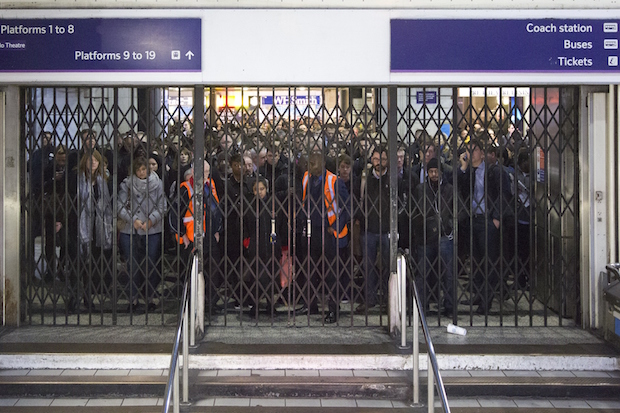Londoners were not a happy bunch this morning. Aside from the cold, wet weather, two-thirds of the capital’s buses were not running — thanks to a strike arranged by trade union Unite. Bus drivers are protesting over pay, as they believe the lack of a collective deal across all bus operators is unfair. Currently, there are 80-odd different pay rates, as this Unite infographic shows:
Time to end the chaos on London’s bus network – one rate for all: http://t.co/fRCLv5FKXt pic.twitter.com/WWESxlbNI9
— Unite the union (@unitetheunion) January 13, 2015
27,000 striking bus drivers causing traffic and commuting chaos is annoying — but this strike comes at a sensitive time as the Tories are hoping to clamp down on strikes. According to Transport for London, less than 16 per cent of the city’s bus drivers voted for today’s strike.
There is a chance if you were reading this in 2016, the bus strike might not be happening at all. The Transport Secretary has announced that the next Conservative government will legislate so that strikes can legally only go ahead with the backing of 40 per cent of those entitled to take part. Boris Johnson explained this morning why the bus strikes demonstrate the need for trade union reform:
‘This is an attempt by the unions to gain power on the back of a very, very low turnout in the key vote concerned. The Conservatives are proposing a very modest change that would prevent key services going out on strike on such a small vote.’
In retaliation, the GMB union have brought out their usual straw man about election turnout, claiming that because many MPs are elected with the support of less than 40 per cent of their electorate, the threshold shouldn’t apply for union ballots. This doesn’t take account that in elections, everyone above the age of 18 can vote in Britain (and therefore can’t moan if they don’t vote and don’t like what the government does). Strikes on the other hand affect thousands who have no say in whether they happen.
Despite the low turnout, Unite have been quick to claim that the public are on their side. But like the RMT’s claim regarding the 2014 Tube strikes, that’s not quite true. In a survey asking ‘do you think all bus drivers should be paid the same’, two thirds agreed. This is a classic example of the ‘would you like a pony’ question; who is going to answer ‘no, I don’t think bus drivers said be paid equally’? It doesn’t mean that Londoners support the disruption across the city.
There’s another incentive for the government to act: days lost to industrial action are up 90 per cent over the last year. The most recent statistics from the ONS show that 782,000 working days were lost due to strikes in the year running up to October 2014, of which 87 per cent were in the public sector:
[datawrapper chart=”http://static.spectator.co.uk/iExCR/index.html”]
The Tories do risk harming their blue-collar credentials with continued union bashing like we’ve seen today. By clamping down on the ability to strike, union members may feel the Tories are always against them and their vote isn’t being courted. Some MPs like Rob Halfon have argued that the Tories and trade unions can be a ‘match made in heaven’ but those higher up in the party, like Boris and Patrick McLoughlin, appear to see more rewards in squaring off with them.






Comments